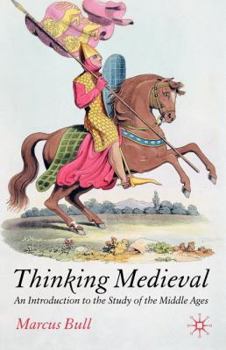Thinking Medieval: An Introduction to the Study of the Middle Ages
Select Format
Select Condition 
Book Overview
This book is aimed at students coming to the study of western European medieval history for the first time, and also graduate students on interdisciplinary medieval studies programmes. It examines the place of the Middle Ages in modern popular culture, exploring the roots of the stereotypes that appear in films, on television and in the press, and asking why they remain so persistent. The book also asks whether 'medieval' is indeed a useful category in terms of historical periodization. It investigates some of the particular challenges posed by medieval sources and the ways in which they have survived. And it concludes with an exploration of the relevance of medieval history in today's world.
Format:Paperback
Language:English
ISBN:1403912955
ISBN13:9781403912954
Release Date:September 2005
Publisher:Palgrave MacMillan
Length:158 Pages
Weight:0.52 lbs.
Dimensions:0.5" x 5.5" x 8.3"
Related Subjects
HistoryCustomer Reviews
1 rating
Thinking Medieval
Published by Thriftbooks.com User , 18 years ago
Thinking Medieval is targeted to an introductory academic audience, but it is so well written, easy to read and fascinating it would appeal to anyone with an interest in the Middle Ages. This is really a book about "medievalism" - the Middles Ages in popular culture and modern scholarship - which is extremely helpful in better understanding how to approach and read medieval history. Dr. Marcus Bull is a professor at Bristol University in England. There are four chapters. Chapter 1 deals with the Middle Ages in modern popular culture. Bull examines the conflicting positive and negative views of the period; how it is portrayed in movies in particular a case example Pulp Fiction; books such as Timeline and A Connecticut Yankee in King Arthur's Court; the Gothic Novel of the 18th-19th centuries; the role of Scott and Ivanhoe; Neo-Gothic architecture; J.R.R. Tolkien; and much much more. I've studied this endlessly fascinating topic before, but Bull finds new perspectives and anecdotes that make it worthwhile even for the most hardened myth-buster. Arcane as it seems, medieval mythology is so ingrained in popular culture it is probably as critical to understanding ourselves as understanding the period in question. Chapter 2 asks "What are the Middle Ages?" It looks at questions of periodization and how to define the beginning and end of the period and if it even makes sense to call it a period at all, as if it had a single "essence". He ends with what seems like a radical, but logical, suggestion to consider removing "medieval" and "Middle Ages" from academic discourse and find new more finely tuned categorizes for the immense diversity and scope of the time. Chapter 3 "The Evidence for Medieval History" examines how we know what we know, mainly from source documents and surviving art and architecture. Very interesting discussions about how much written material has survived (probably less than 1%) and how this has shaped our views of the period. It also discusses the 12th century break between the oral and written culture when written evidence explodes, before which the amount of written material is so limited that scholars can actually know all there is to know about a time period, which has its advantages and disadvantages. Chapter 4 "Is Medieval History Relevant?" is essentially an apology for why we should study Medieval history, a question which seems to be driven by occasional academic funding squabbles. As someone who studies from home solely for the love of the subject I find it curiously amusing that anyone would think Medieval history is not worth knowing, and feel fortunate we have so many academics devoting a career to it. The chapter also looks at some case examples of areas of study which are still relevant today, such as the English Language and the Crusades. The Bibliography is annotated and excellent and recently updated, many of the cited papers and books are post-2000.





